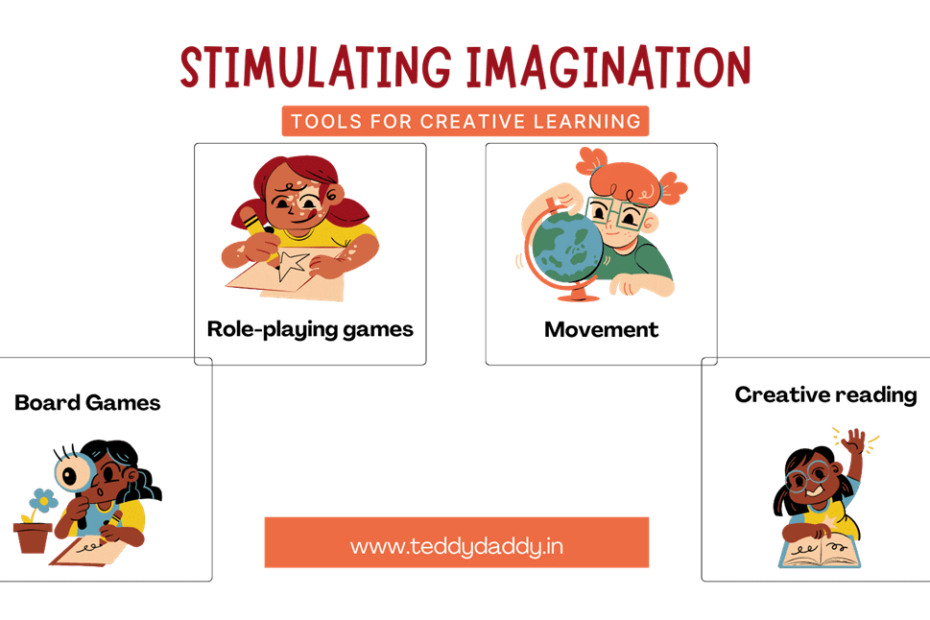Pretend play, often underestimated, is a treasure trove of imagination and creativity for children. In a world of screens and schedules, encouraging children to engage in imaginative play can unlock a world of possibilities. In this article, we will explore the significance of pretend play in nurturing creativity among kids. We’ll delve into planning imaginative play, its advantages, and disadvantages, and offer interesting facts to enrich your understanding.
The Importance of Pretend Play
Pretend play, also known as imaginative or dramatic play, is a vital part of childhood development. Parents can harness its power to:
1. Spark Creativity and Imagination:
Planning Play Scenarios: Encourage your child to create stories and scenarios that stimulate their imagination. For instance, they can pretend to be explorers venturing into a magical forest, with one child taking on the role of a brave adventurer, another as a friendly forest creature, and another as a curious botanist. For example, when children take on the roles of different characters, they can explore imaginative adventures while developing crucial creative thinking skills.
School Dress Rabbit Doll – Green, 40 CM
Benefits of Imaginative Play: Imagination knows no bounds. Through imaginative play, children explore their creativity, experimenting with roles and situations they encounter in their daily lives. By pretending to be characters from their favorite stories or inventing entirely new worlds, they expand their horizons.
2. Enhance Problem-Solving Skills:
Pretend play allows kids to solve problems, make decisions, and improvise. Parents can integrate problem-solving techniques and concepts into play. Suppose your child is pretending to be a detective solving a mystery. They might need to find clues, decipher codes, and use critical thinking to crack the case.
Consider, using stories and scenarios to teach moral values and decision-making during playtime. For instance, in a pretend scenario where they are explorers, they may encounter a dilemma about whether to disturb a hidden nest of fictional creatures. This presents an opportunity to discuss ethical choices and the consequences of their decisions.
Benefits of Pretend Play For Kids: Children can learn valuable life lessons through imaginative play. They can navigate moral dilemmas, make choices that reflect their values, and develop problem-solving skills that come in handy in real-life situations.
3. Improve Social Skills:
Disadvantages of Solitary Play: While pretend play can be solitary, it’s essential to balance it with cooperative play. Discuss the significance of teamwork and collaboration. Imagine your child and their friends engaging in a pretend play scenario where they run a bustling restaurant together. They’ll need to take orders, cook, serve, and handle customer interactions.
Emphasize, games and activities that require teamwork and interaction with others, such as building a pretend city or organizing a pretend carnival.
Benefits of Pretend Play: Cooperative pretend play helps children understand the importance of teamwork and social interaction. It enhances their ability to work with others, resolve conflicts, and fosters social skills that are valuable in school and life.
Pretend play offers a multitude of benefits for children:
1. Cultural Connection:
Facts About Traditions: Engaging in pretend play can help children connect with cultural customs and traditions. Imagine your child pretending to celebrate a traditional festival. They can dress up, perform rituals, and share in the joy of the occasion.
Fun Fact, pretend play often incorporates elements of cultural traditions, allowing children to explore and appreciate their heritage.
2. Language Development:
Using Language Creatively: Encourage children to use language creatively during play, reinforcing language skills and expanding their vocabulary. In a pretend play scenario where they’re explorers in a dense jungle, they can create a language for communicating with imaginary creatures they encounter.
Benefits: Creative language use enhances cognitive abilities and linguistic development.
3. Emotional Expression:
Expressing Emotions through Play: Pretend play allows children to express emotions, understand feelings, and learn empathy—a valuable skill for social interactions. Suppose your child is playing the role of a doctor caring for a sick teddy bear. They can demonstrate empathy, comfort the bear, and show kindness.
Real-Life Connection: Children can use imaginative play to explore and understand various emotions and develop empathy toward others.
Disadvantages of Excessive Screen Time:
The Screen-Time Challenge: Excessive screen time can diminish the benefits of pretend play. Parents should strike a balance between imaginative play and screen exposure. Imagine a scenario where children are engrossed in a screen for hours on end. They miss out on opportunities for creative play, social interaction, and hands-on learning.
Facts about Pretend Play:
Role Models: Many successful individuals attribute their achievements to a childhood filled with imaginative play. Icons often reminisce about their creative childhood experiences, where they imagined themselves as scientists, explorers, or inventors.
Conclusion: In a fast-paced digital world, the power of pretend play remains timeless. Parents hold the key to unlocking their children’s imagination by encouraging imaginative play that stimulates creativity, problem-solving skills, and social interaction. By planning imaginative scenarios, understanding the advantages, addressing disadvantages, and celebrating the unique connection between imaginative play and children’s development, parents can ensure their children grow into creative, empathetic, and socially skilled individuals. Pretend play is not just fun; it’s a transformative journey that shapes future leaders and storytellers, one imaginative adventure at a time.
If you liked our article, we would recommend you to read https://teddydaddy.in/education-and-learning-ideas-for-supporting-childrens-learning-and-education-at-home/ as well.

